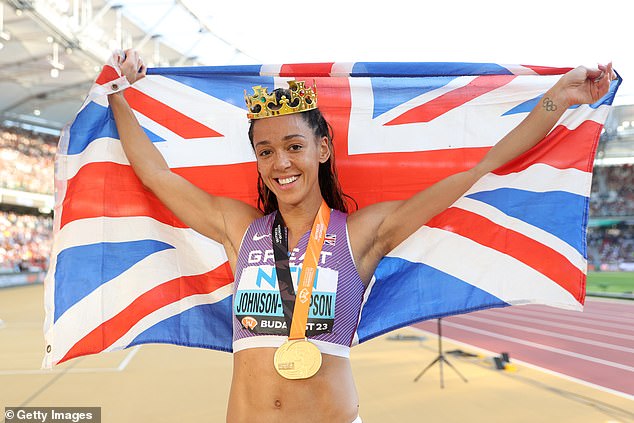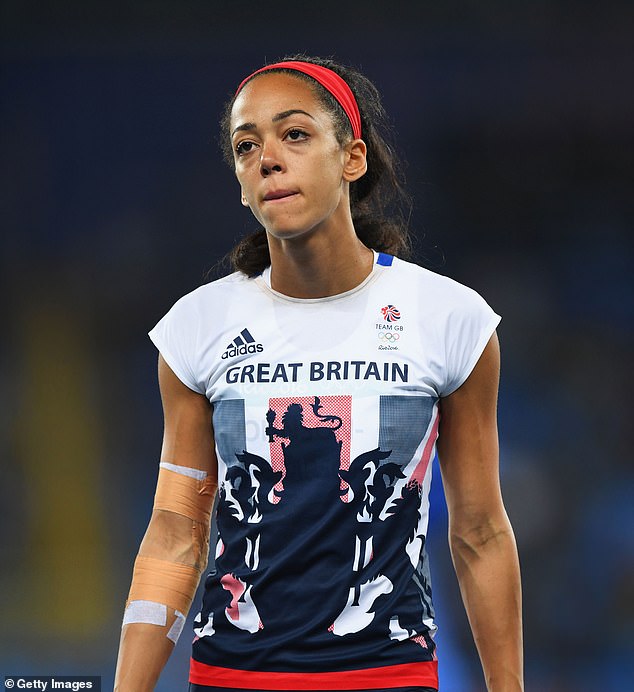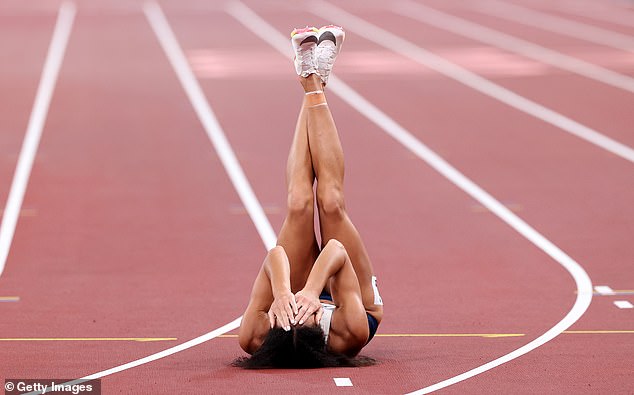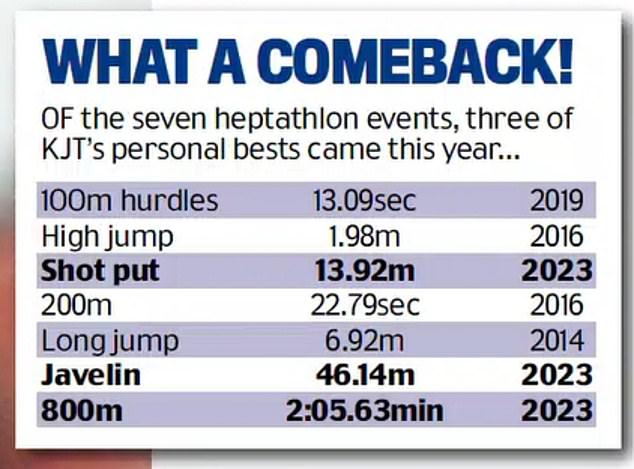How Katarina Johnson-Thompson cleared her toughest hurdle and found contentment… and now the golden girl is eyeing a fairytale in Paris
Katarina Johnson-Thompson remembers the conversation vividly. It was 2016, after one of those soul-torn seasons, when a friend offered some thoughts about life and sports. The words were as true then as they are now.
“It wasn't long after the Rio Olympics and they were horrible for me,” Johnson-Thompson says. “I remember Denise Lewis telling me that some people's lives are just beautiful and stable, and others are more like riding waves in a storm and just hanging on for dear life.
'I always wanted some calm water, but that has never happened to me. Up and down, up and down. Denise was quite spot on!'
The key here is that Johnson-Thompson can smile about it. She can actually laugh about it. And that's because she's on the right side of the wave again. Back in gold and back on top, through courage and struggle and after all the pain, tears, fractures and confused thoughts.
These reflections come as she sits in a coffee shop in Loughborough and Johnson-Thompson speaks of a sense of finally 'contentment'. Of being 'satisfied' at 30, even though she says she isn't, because when has anything ever moved in straight, neat lines with this athlete?
Katarina Johnson-Thompson is aiming for Olympic glory in Paris after a courageous comeback
But her trip to Budapest in August changed so much: that second and most unexpected world heptathlon gold medal, won four long years after the first, reshaped her story.
If there has been a braver comeback in British sport in 2023, it is incredibly hard to find. That's why Johnson-Thompson could and should be the standout candidate on the Sports Personality of the Year shortlist.
We met in the hours after it was announced on Tuesday. “It was really nice to hear,” she says. 'I don't know if my chances are good or not. Mary Earps played the World Cup final for the Lionesses while I did my heptathlon. She was great. While she saved the penalty, I did my javelin. She's probably the odd one out, but to be honest, I'm just so happy that the year turned out the way it did for me. I just want to celebrate the year.
'It's just been a very satisfying year after so many bad moments. I was working towards the Olympics in Paris, just trying to get some peace back into my life, get my career back on track, and I had no idea this would happen for me in Budapest.
'My anxiety just faded into the background and people felt sorry for me because of the things that went wrong, so to change that I felt, I don't know… satisfied.
'I still have to sort out my feelings, but I think this was my greatest sporting achievement after everything that happened.
“I mean, we've had a few different conversations this time of year, right?” That's true, and in their own way they chart the turbulence of a career forever teetering between triumph and torture.
In 2019, the Johnson-Thompson story was about the uplifting world title in Doha that followed all those years of injuries and missed opportunities. We met in January the following year in London, where she said she felt validated, albeit with the discomfort of knowing, more than anyone else, that things could still go wrong on the biggest stage of them all.
And of course that happened. When we did an interview at a hotel in Surrey in December 2021, she could barely get her words out. She recalled recovering from a torn Achilles tendon to make it to the Tokyo Olympics, only to tear a calf muscle while moving. in serious medal competition.

The world's most unexpected heptathlon gold medal has reshaped her story

Johnson-Thompson was disappointed when he finished sixth at the 2016 Rio Olympics
During that last conversation, she went so far as to say, “I used to really believe in the idea that what doesn't kill you makes you stronger. That is not the case. It just breaks you, makes you more vulnerable and resentful.”
Never an athlete to hide her feelings, she was in pieces. Today she can look back from a much better place.
“I shouldn't have done interviews so soon after Tokyo,” she says. 'What they tell you about going through phases is true. I hated and resented the sport and it took time. I was in such a bad place. But you get to a point where you accept it and you can go one way or try to change it. Did it make me stronger? Maybe. Don't know.
“There was a very feasible future where I had just retired and was bitter about things. But it can make you stronger.
'I think back to Doha and I had allowed myself to think that it would be full steam ahead after the win there. That I was around the corner – “Look at me now.”
'Looking back, I almost feel naive. Following Doha with all that pain really affected me mentally. To go from that point to victory in Budapest surpassed anything I've done in the sport. I really didn't want to be that person that people felt sorry for and after Tokyo it was my fear, so I'm happy to have closed that chapter. I'm glad I could show that it didn't finish me off.
'But I still feel like I want to keep going. I want this to be the beginning of the final phase of my career.”
Of course, Johnson-Thompson is talking about the Olympics. Throughout her career she has won gold medals at European, Commonwealth and world levels, but never one at the Games.
Since her introduction to the public under the name 'The next Jessica Ennis' in London 2012 – a label that was damaging for a while – it has been an area that has produced her greatest disappointments. During Paris 2024 she will have the opportunity to complete her own circle.
“The Olympics historically haven't gone well for me,” she says. 'I don't know how I would define it properly in Paris. I went to Rio as a 23 year old and shouted gold or nothing and that was quite immature. I really wish I got bronze for it and not sixth.
'I'm not going to make the same mistakes. Of course I want a medal, but getting there healthy is the main goal. I know when I am that a performance can happen. I am really, really motivated for it and there was a time when that was no longer possible.'

KJT recovered from injury to compete in the 2020 Tokyo Olympics, but then tore a calf muscle

Much of that general revival has been the work of Aston Moore, the amiable sage of 67 who became her third coach in two years in 2022. He put her back together after Tokyo. “When I went to him, I just needed that peace in my life that I was talking about,” she says. “In 2022 I had no idea if I would ever be able to get back to the level, but he has been great for me and I now see areas to improve.”
It remains to be seen whether Paris will be the final crack for an athlete with many physical and emotional scars. Or when she has to pay for a promise she made almost a decade ago to take her agent to Las Vegas if she wins.
She does not rule out a change in 2028, although she admits that she has “no idea” what the next phase of her life would entail without that change. She loves the work she does at the KJT Academy, which is supported by the Liverpool Football Club Foundation and helps young athletes from the North West, but it's not an empty space that scares her.
“I just want to see what the next year brings,” she says. 'I'm enjoying it again and that's enough for now.'
